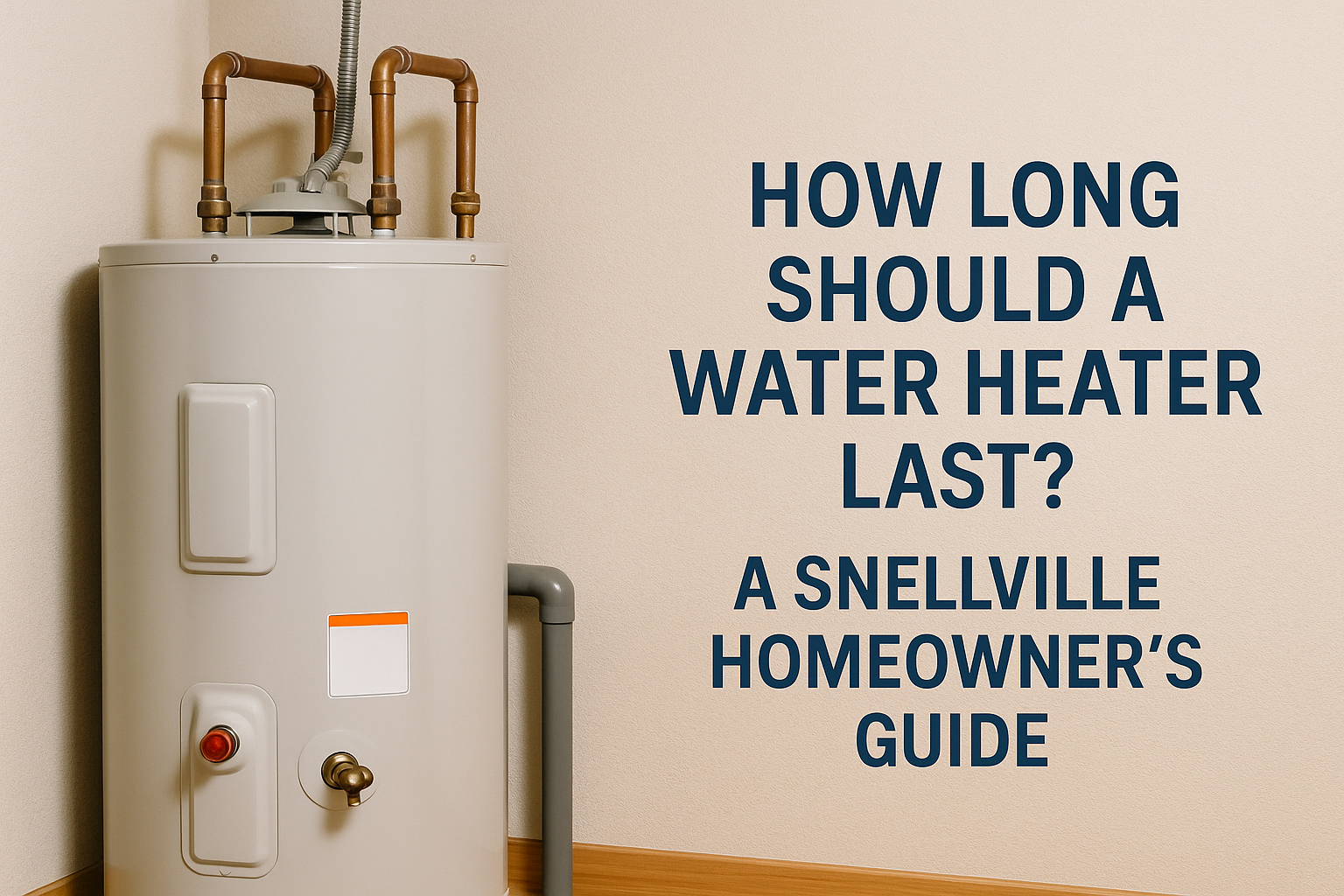If you’ve ever wondered whether your water heater is nearing the end of its life, you’re not alone. “How long should a water heater last?” is a common question for homeowners. The answer can vary depending on the type of water heater and how well it’s maintained. Snellville homeowners should understand the typical lifespan of water heaters and the signs that it’s time for a replacement. This guide covers what to expect and how to plan for a new water heater before an old one fails.
Average Lifespan of Water Heaters
Conventional tank-style water heaters tend to last about 8 to 12 years in normal use. Gas and electric models are similar in lifespan, with electric ones sometimes on the higher end of that range if water quality is good. Tankless water heaters, on the other hand, have a longer life expectancy – often up to 20 years or more– because they don’t store water that can corrode the unit. Of course, these are averages. Some tanks might only last 6-7 years in harsh conditions, or conversely, a well-maintained unit might last 15 years. Key factors influencing lifespan include:
-
Water Quality: Hard water with high mineral content causes more sediment buildup inside a tank, which can lead to overheating and tank damage. Snellville’s water is moderately hard, so sediment can accumulate faster without regular flushing.
-
Usage: A large household that uses a lot of hot water (multiple showers, laundry, dishwasher daily) will cycle the water heater more frequently, potentially wearing it out sooner.
-
Maintenance: Water heaters that are flushed annually and have their anode rod inspected/replaced tend to last significantly longer. Lack of maintenance often shortens a heater’s life.
-
Installation location: Heaters located in damp, unconditioned spaces (like a crawl space or garage) might corrode faster on the outside. Also, if a water heater is set to a very high temperature, it works harder and can fail sooner.
Signs Your Water Heater Is Past Its Prime
How can you tell when your water heater is nearing the end of its useful life? There are several warning signs to watch out for:
-
Age of Unit: First, consider age. If your tank unit is over 10 years old, it’s wise to start budgeting for a new one. You can check the manufacture date from the serial number (usually the first four digits indicate month and year).
-
Rusty or Discolored Hot Water: If you turn on the hot tap and see brownish, rusty water, it could be coming from corrosion inside the water heater tank (First, ensure it’s only hot water that’s discolored, not cold – if cold is clear but hot is rusty, that points to the heater.) Rust inside the tank means the interior lining has deteriorated, and a leak may be imminent.
-
Rumbling or Banging Noises: Loud rumbling, popping, or gurgling noises when the burner or heating elements are on indicate significant sediment buildup in the tank. As water heats, it bubbles through the sediment layer, causing those sounds. This is a sign the unit has been neglected and is losing efficiency – it’s often a prelude to failure if not addressed.
-
Leaks or Moisture: Obviously, any water pooling around the base of the heater is a bad sign. Sometimes a slight leak can occur at a valve or connection, which might be fixable. But if the tank itself is leaking (even a small trickle), the internal tank has cracked or corroded through – at that point, replacement is the only option. Inspect the area around your water heater periodically for moisture.
-
Inadequate Hot Water: If you notice your hot water supply isn’t what it used to be – perhaps you’re running out of hot water faster, or the shower isn’t getting as hot as it once did – it could mean one of the heating elements has failed (in an electric heater) or simply that the unit is wearing out. A dip in performance at the end of life is common. It might also indicate sediment taking up volume in the tank, effectively reducing its capacity.
Repair vs. Replace Considerations
When facing an aging or malfunctioning water heater, homeowners often wonder: would it be better to repair it or replace it altogether? A few guidelines can help you decide:
-
Age factor: If the heater is near or beyond the typical lifespan (10+ years for tank, 18+ years for tankless), replacement is usually more cost-effective than sinking money into repairs. A new unit will also likely be more energy efficient, saving on utility bills.
-
Cost of repair: Get an estimate for fixing the issue. For example, replacing a heating element or thermostat might be a few hundred dollars. If your tank is younger and the repair cost is reasonable, fixing it could buy you more years of service. However, if the tank itself is compromised or the repair is a significant fraction of the cost of a new unit, replacement is wise.
-
Frequency of problems: Have you had to repair the water heater multiple times in recent years? Frequent breakdowns are a clear indicator that the unit is on its last legs.
-
Upgrading benefits: Newer water heaters (especially Energy Star models) are better insulated and more efficient, which can reduce operating costs. If your current unit is over 12-15 years old, a replacement might pay for itself in energy savings over time. Additionally, you might consider upgrading tank size if your household’s hot water needs have increased, or switching to a tankless system for on-demand endless hot water.
Planning for a Replacement
No one likes cold showers, so it’s best to be proactive. If your water heater is in the old-age category or showing the warning signs above, start researching replacements before it fails completely. True Blue Plumbing can help you determine the right type and size of water heater for your needs. We handle water heater replacement from start to finish – including safe removal of the old unit and installation of the new one up to code.
When selecting a new water heater, here are a few considerations:
-
Capacity: For tank heaters, choose a capacity (in gallons) that meets your household’s peak usage. Common sizes are 40 or 50 gallons for a typical family. If you often run out of hot water, consider sizing up or going tankless.
-
Fuel type: Stick with your current energy source (gas or electric) unless there’s a compelling reason to switch. Gas heaters recover faster (heat water quicker) and often have lower operating costs in areas with inexpensive natural gas. Electric heaters may have lower upfront cost and are simpler (no venting needed), which can be advantageous if your home doesn’t have a gas line or chimney vent.
-
Energy efficiency: Compare the Energy Factor (EF) ratings. Higher EF or the new Uniform Energy Factor (UEF) means more efficient. High-efficiency gas units might use condensing technology or power vents. Heat pump water heaters (electric hybrid heaters) are extremely efficient for warm climates – they draw heat from the air to warm the water.
-
Tankless vs Tank: Tankless heaters free up space and offer endless hot water, which is great for large families or if you have a luxury master bathroom with a large tub. They do cost more upfront and might require upgrades to your gas line or electrical capacity. However, their longer lifespan and energy savings can offset those costs over time.
Don’t Forget Maintenance
Whichever route you go, remember that maintenance is key to longevity. For tank heaters, draining a few gallons every 6-12 months helps remove sediment. For tankless, periodic descaling (especially if you don’t have a water softener and your water is hard) will keep it running efficiently. Also, keep an eye on the pressure relief valve on tank heaters – test it occasionally to make sure it’s not clogged (this is a safety device that prevents pressure buildup).
In summary, the typical water heater in Snellville will give you around a decade of service, but don’t just rely on the calendar – pay attention to the signs of aging. By being proactive and replacing your water heater before it fails, you can avoid the inconvenience of sudden cold showers or a flooded utility room. If you’re unsure about your water heater’s condition, True Blue Plumbing can help with an inspection. We’ll give you an honest assessment of whether a simple repair or a full replacement makes sense.
Don’t wait until you’re left without hot water. If your water heater is getting up in years or acting up, reach out to True Blue Plumbing, Snellville’s trusted water heater experts. We offer prompt water heater services – from repairs to new installations. Let us help you enjoy reliable hot water and peace of mind about your home’s plumbing. Contact us today to schedule a service or consultation about your next water heater.


